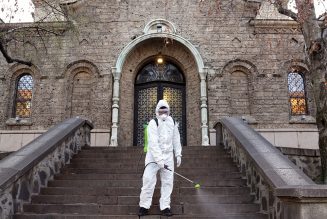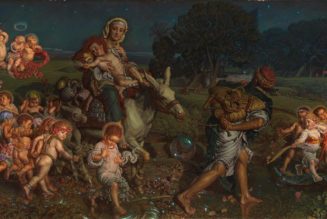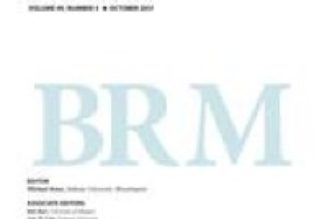
Bernard of Clairvaux, the great 12th-century saint and Doctor of the Church who renewed the Western monastic tradition, once warned that “The most grievous danger for any pope lies in the fact that, encompassed as he is by flatterers, he never hears the truth about his own person and ends by not wishing to hear it.”
Every pontificate has its courtiers. The current one is no exception; quite the opposite. Thus, St. Bernard’s words came easily to mind as I read a recent Austen Ivereigh article for America magazine. In it, Ivereigh claimed that “over the last eight years, a powerful U.S.-based media conglomerate has used its formidable wealth and power to turn a large portion of the people of God against Rome and its current occupant. And for good measure, against key reforms of the Second Vatican Council.”
Frightening stuff; so where might this muscular wickedness spring from: Comcast? Facebook? George Soros’s Open Society Foundations? No. Today’s spirit of schism—Mr. Ivereigh describes it as “the diabolos, and calling it something else is just putting lipstick on a pig”—is the work of those iniquitous devils at . . . EWTN. Yes, that’s the network founded by that arch-troublemaker and woman religious, Mother Angelica, and funded largely by tens of thousands of small donations from ordinary, faithful Catholic individuals and families.
To be fair, Ivereigh’s article simply elaborates on comments that Pope Francis made recently to Jesuits in Slovakia. Pope Francis didn’t name the offending media organization, but as journalists quickly confirmed, he meant EWTN. It’s surprising to hear any pope be so publicly and personally sensitive to perceived ill will from a few commentators at a modest network (by secular standards) based on another continent. Conflict, a lot of it, both within and beyond the Church, comes with the job of every bishop. The bishop of Rome is not excused from that unhappy burden. And EWTN’s Raymond Arroyo, whom Ivereigh seems to regard as a special tool of the diabolos, does not pose quite the same fearsome threat to the Church as, say, China’s Xi Jinping. Or significant figures in America’s current leadership.
Mr. Ivereigh is right to see mean-spirited ecclesial criticism from anyone as poisonous to the unity of the Church. But he might take his own words to heart in examining some of his own past work. Moreover, not all criticism in a family is ill-intended or disloyal or inaccurate. Some anger, even anger at legitimate authority, is righteous. The virtue of Christian obedience is rooted in speaking the truth—with love, but frankly and firmly—and true religion has nothing to do with a posture of servility.
As an EWTN board member for many years before retiring, I’m well acquainted with the network’s shortcomings. It can always improve. But it has managed to serve the gospel for decades now with skill and endurance where many others have failed. Thus, it’s hard to read critics of the network without also sniffing their peculiar cologne of faux piety, jealousy, and resentment. EWTN’s achievements deserve praise and warrant pride. I admire the dedication of its leaders and staff. I’m grateful for the network’s service to the Word of God. And any suggestion that EWTN is unfaithful to the Church, the Second Vatican Council, or the Holy See is simply vindictive and false.
Mr. Ivereigh is a capable writer—I was pleased to endorse his first (and best) book, The Great Reformer, grandiosely titled and with a light seasoning of snark, but a worthwhile read nonetheless—and Pope Francis is a complex and absorbing subject for any honest biographer. Ivereigh should, but likely won’t, be embarrassed by his America article. The role of courtier doesn’t suit him. But then he’s hardly alone in that line of work during the current pontificate.
Massimo Faggioli’s sunny assessment of Joe Biden and Biden’s seeming common ground with Pope Francis—his recent book is Joe Biden and Catholicism in the United States—certainly qualifies him for courtier status, despite his text being rudely dismembered by veteran religion journalist Ken Woodward in a Religion News Service critique. Prof. Faggioli’s relentless commentary on the United States, American Catholics, and so much more—he arrived in our country in 2008, apparently knows everything about us, and currently teaches at Villanova University—makes up in astonishing breadth for what it lacks in depth. In December of last year, Faggioli suggested that “the parallel between [Biden] and the late Italian pope [John XXIII] certainly offers hope from a historical point of view.” Or maybe not so much. Any parallel between the two men might be news to the saintly dead pope, since the Democratic party has effectively sacramentalized abortion, exterminated pro-life Catholic witness in its ranks—ask former Congressman Dan Lipinski—and our “Catholic” president has signed on fully to the party’s slash and burn campaign.
Neither Ivereigh nor Faggioli measures up, though, to that zenith of melodrama and ill will achieved in 2017 by Antonio Spadaro and Marcelo Figueroa. Writing in La Civiltà Cattolica—“Evangelical Fundamentalism and Catholic Integralism: A Surprising Ecumenism”—the authors provide a Crayola coloring-book version of Catholic-Evangelical relations in the United States, a portrait that’s simultaneously sweeping and all-thumbs, and shaped by standard European and Latin American pique toward the Yankee colossus. The irony is that the article could have been genuinely penetrating and very fruitful in its criticism. But that would have taken more work, more humility and balance, and less resentment.
No pontificate is well served when its promoters show contempt and belligerence toward perceived enemies. That kind of flackery simply produces more, and even more determined, critics who do indeed elide into enemies. One can hope that Pope Francis understands this. In the meantime, it’s worth stressing that the latest attacks on EWTN are both ugly and unjust, and calling them something else is, to borrow a thought from Mr. Ivereigh, “just putting lipstick on a pig.”
Charles J. Chaput, O.F.M. Cap., is the archbishop emeritus of Philadelphia.
First Things depends on its subscribers and supporters. Join the conversation and make a contribution today.
Click here to make a donation.
Click here to subscribe to First Things.
Join Our Telegram Group : Salvation & Prosperity








